初中英语单词课件
七年级下册英语单词 ppt课件
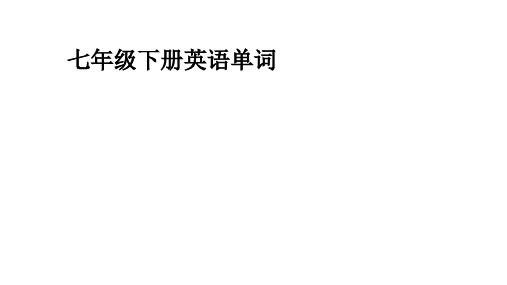
across from the park. Tony: Oh... __w_h_e_r_e_'s__C_e_n_t_e_r_S_t_r_ee_t____? Linda: It’s not too far from here. I can walk with you. Tony: Oh, that’s great! _T__h_a_n_k_s_s_o_m__u_c_h__. Linda: No problem.
Peter: Oh, nice. _W__h_a_t_d_i_d__y_o_u_d_o_______? Eric: I went fishing every day. And I fed the chickens with my
grandpa. _I_t_w__a_s_s_o_m__u_c_h_f_u_n___________. Peter: Sounds good. __H_o_w__w__a_s_t_h_e_w__e_a_th_e_r__th_e_r_e? Eric: It was great, and the air was so clean. I watched the stars at
and one mapo tofu with rice.
Tom: Yes, _T_h_a_t_'_s_r_ig_h_t_____.
Peter: Hi, Eric. _H_o_w__w__a_s_y_o_u_r_t_r_i_p_____ last week? Eric: It was great. I visited my grandparents in the countryside.
night. They were so beautiful.
初中英语 人教版八年级下册unit 6 单词课件(ppt51张)

My father will do the dishes instead of my mother. Mike took part in the game instead of me last week. Tony went fishing instead of going swimming. 注意:instead和instead of有时可以相互转换。 如: Lisa didn’t listen to music. Instead, she read. =Lisa read instead of listening to music.
fit v. 适合;合身 1 vi 合适 e.g. The new shoes don’t fit, so she
gave them back. 新鞋子不太合适,因此她退了。
Ⅱ. 完成句子,每空一词。 1)提醒汤姆明天参加聚会。
_R_e_m__i_n_d_ Tom ____t_o___ ____g_o___ to the party tomorrow. 2)这封信让我想起了他以前说过的话。 The letter _r_e_m__in_d_s_ me ____o_f ___ what he said before. 3)我提醒简我们星期六有个会议。 I _r_e_m_i_n_d_e_d_ Jane __t_h_a_t___ we had a meeting on Saturday.
e.g. The picture reminds him of his beautiful hometown. 这幅画让他想起了美丽的故乡。
remind sb. to do sth. 提醒某人去做某事
e.g. Please remind me to come back early. 请提醒我早点回来。
初中英语词汇教学课件34张
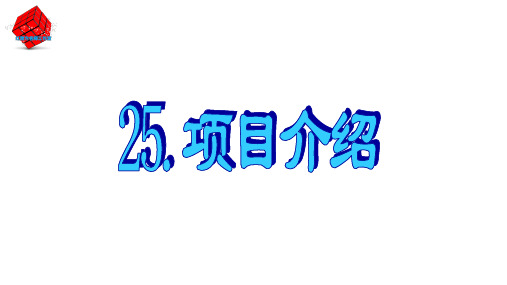
from June 10 between 20.
to
days
As a student, I am strong for the activity if it is
strongly
because
very meaningful and helpful. I hoped that this
hope
kind of activity will continue in the future.
our
arranging an activity. We students of Senior 3 are called on to give away our using books, newspapers
used
or magazines to the students in the lower grades.
13. 按照时间/空间顺序
in__o_r_d__e_r_o_f__ti_m__e_/s_p__a_c_e__
14. 起源于
_o_r_i_g_i_n_a_t_e_f_r_o_m_________
15. 目的在于/旨在……
__a_i_m__t_o_…______________
套用句式 1. 第22届北京国际图书博览会于8月26日至30日在 中国国际展览中心举行。
习作修改(做短文改错,背经典范文) Dear editor,
I am a student of Senior 3 in a middle school in Fujian Province.
In order that we can make∧best of learning the
materials, the Students’ Union of their school is
Unit2Vocabulary词汇课件牛津深圳版英语七年级上册

just
恰好
Thank you !
6、go to bed 去睡觉(fall asleep 睡着) 7、get up 起床(wake up 叫醒) 8、on foot 步行 9、be full of energy充满活力(=be filled with ….) 10、get... ready for 准备好 11、put on 举办,上演,穿上 12、clean up 打扫干净(tidy up整理) 13、pick up 取,摘,接sb.
4、develop v. 发展
developed adj. 发达的 developing adj. 发展中的 development n. 发展 developed country 发达国家 developing country发展中国家
5、skill n. 技能
skilled/ skillful adj. 熟练的
6、teen adj. 青少年的
数字+teen:fifteen, sixteen teenager n. 青少年(13-19)
7、greeting n. 问候
greet v. 问候
8、energy n. 精力
energetic adj. 精力充沛的 powerful adj.
9、luckily adj. 幸运地
新G7U2 School Life
Words and phrases
1、activity n. 活动
active adj. 积极的
2、practise v. 练习
practice n. 练习 practise doing sth.练习做某事
3、solve v. 解决
solution n. 解决办法
mood 情绪,心情
初中英语单词ppt课件

英 语
第3讲 七年级(下)Units 1-6
1.sing(v.)→ song (n.)歌曲→ singer (n.)歌手 2.speak(v.)→ spoke (过去式)→ spoken (过去分词) 3.write(v.)→ wrote (过去式)→ written(过去分词)→ __w__ri_te_r____(n.)作者 4.teach(v.)→ teacher(n.)教师 5.up(adv.)→ down (反义词)向下 6.tooth(n.)→ teeth (复数)牙齿 7.early(adj.)→ earlier (比较级)→ earliest (最高级)→ _____la_t_e___(adj.反义词)晚的 8.run(v.)→ runner (n.)跑步者→ running (现在分 词)→ ran (过去式) 9.new(adj.)→ old (adj.反义词)旧的 10.many(adj.)→ more (比较级)→ most(最高级) 11. leave(v.)→ ____le_f_t___(过去式)
in the morning and come back home at seven in the evening. 5. He is in Class One and I am in Class Two. 6. He was fond of drawing when he was yet a child. 7. Neither has he changed his mind, nor will he do so. 8. What he said at the meeting is very important, isn’t it? 9. The farmer is showing the boy how to plant a tree. 10. Both Tom and Jack enjoy country music.
初中英语单词 PPT课件 图文
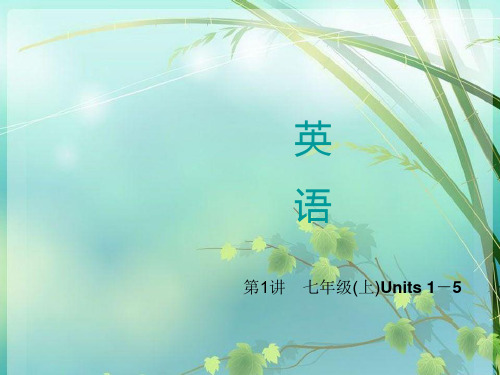
for breakfast
ask
for
eating habits
How much
pair of
How old
school trip
English test
art festival
soccer ball
for sure
at
good
on weekends
a good time/day
speak
play chess
the guitar/piano
good at
tell stories
swimming
be good with
talk
help
with
on
weekend
weekends
11. 结交朋友 12. 起床 13.get 穿上衣服 14. 刷牙 15. 淋浴 16. breakfast 吃早饭 17. one's homework 做作业 18. 散步 19. ... ... 要么……要么…… 20. of 大量;许多
first
last/family
middle
phone/telephone
card
Lost
Found
watch
excuse
thank you
set
photo
family
play
英 语
第2讲 七年级(上)Units 6-9
1.healthy(adj.)→ (n.)健康 2.really(adv.)→ (adj.)真的→ (adj.同义词)真的 3.fat(adj.)→ (adj.反义词)瘦的 4.good/well→ (比较级)→ (最高级) 5.buy(v.)→ (现在分词)→ (过去式)购买 6.sell(v.)→ (n.)特价销售;出售 7.favorite(adj.)→ (同义短语) 8.music(n.)→ (n.)音乐家→ (adj.)音乐的 9.happy(adj.)→ (反义词)→ (n.)高兴 10.busy(adj.)→ (n.)生意;商业→ (adj.反义词)空闲的 11.art(n.)→ (n.)艺术家 12.useful(adj.)→ (adj.反义词)无用的 13.photo(n.)→ (pl.)照片
初中英语词汇学精美课件ppt (1)
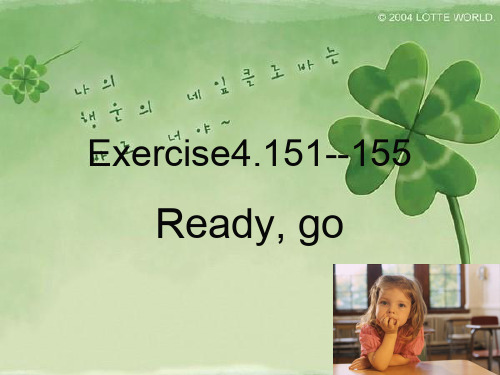
tractor=tract+or(者,物)n.拖拉机,牵引者 traction=tract+ion(名词后缀)n.牵引力,拖拉 tractive=tract+ive(形容词后缀)adj.牵引的,拖的 distract=dis(否定,相反)+tract v.分心,困扰 contract=con(together)+tract v.收缩,缔结,感
adj.热力学的,热力的
thermonuke=thermo(热)+nuke(核武器)
n.核子武器
thermowear=thermo(热)+wear(衣着,装)
n.保温衣服
Tort=twist(扭,曲)
torsion=tor+ion(名词后缀)n.扭转
tortile=tort+ile(…的)adj.卷的,扭转的
n.无神论者
atheism=a(没有)+the(神)+ism(理论)
n.无神论
monotheism=mono(单一)+the(神)+ism(理论)
n.一神论,一神教
pantheism=pan(all)+the(神)+ism(理论)
n.泛神论,多神教
Thermo=heat(热的,与温度有关的)
n. 有神论,一神教
theist=the+ist(者)
n.有神论者,一神论者
theologian=theo+log(学)+ian(者)
n.神学家,神学者
theocracy=theo(神)+cracy(权力)
七年级上册英语单词课件(人教版)

see /si:/ v
理解;明白
can /kæ n/ modal v 能;会
say /sei/ v
说;讲
my /mai/ pron 我的
-
7
UNIT 1
name /neim/ n
nice /nais/ adj
to /tu:/
meet /mi:t/ v
too /tu:/
adv
your /jɔ:/ Ms. /miz/
adj.& n adj.& n adj.& n adj.& n interj
(=colour) 颜色 红色(的) 黄色(的)
绿色(的)
蓝色(的) 黑色(的) 白色(的) 紫色(的)
棕色(的);褐色(的)
-
6
UNIT 3
the /ði; ðə/ art
指已提到或易领会到的人或事
now /nau/ adv 现在;目前
七年级上学期英语单词课件
小新星教育
-
人教版1
UNIT
good /gud/ adj
morning /'mɔ:niŋ/ n
Good morning! hi /hai/ interj hello /hə'ləu/ interj afternoon /,a:ftə'nu:n/ n Good afternoon! evening /'i:vniŋ/ n Good evening!
adj
in English
map /mæ p/ n
cup /kʌp/
n
ruler /'ru:lə/ n
pen /pen/
n -
什么
是 这;这个 用;以 (表示使用语言、材料等) 英语 英格兰的;英语的
七年级上册英语单词(人教版)PPT课件

see /si:/ v
理解;明白
can /kæ n/ modal v 能;会
say /sei/ v
说;讲
my /mai/ pron 我的
UNIT 1
name /neim/ n
nice /nais/ adj
to /tu:/
meet /mi:t/ v
too /tu:/
adv
your /jɔ:/ Ms. /miz/
telephone/phone number 电话号码
first /fə:st/
adj 第一
first name
名字
UNIT 1
last /la:st/ adj last name
friend /frend/ n China /'tʃainə/
最后的;末尾的 姓
朋友 中国
middle /'midl/ adj 中间的;中间
1
好的
早晨,上午
早上好! (用于打招呼)嗨;喂 你好;喂 下午 下午好! 晚上;傍晚 晚上好!
UNIT 1
how /hau/ are /a:/ you /ju:/ How are you?
I /ai/ am /æ m/ fine /fain/
adv v pron
pron v adj
怎样;如何
是 你;你们
你好吗? 我 是 健康的;美好的
thanks /θæŋks/ interj.&n 感谢;谢谢
OK /əu'kei/
interj.& adv 好;可以
UNIT 2
what /wɔt/ pron.&adj
is /iz/
v
七年级上册英语Unit 1单词课件(人教版)
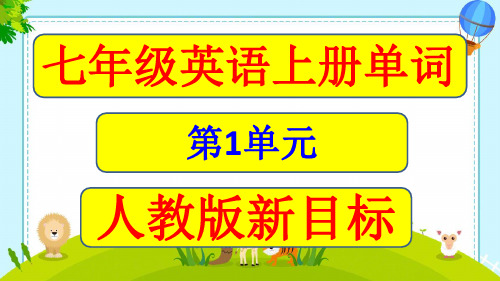
n. 朋友
音标 /'ʧaɪnə/
பைடு நூலகம்
单词 China
汉语 意思
n. 中国
音标 /'mɪdl/
单词 middle
汉语 意思
adj. 中间的;n.中间
音标 /skuːl/
单词 school
汉语 意思
n.学校
短语 middle school
汉语 意思
中学;初中
音标 /'ʤiːnə/
单词 Gina
汉语 意思
音标 /naɪn/ 单词 nine
汉语 num.九
意思
音标 /'telɪfəʊn/
单词 telephone
汉语 意思
n.电话;电话机
音标 /'nʌmbə(r)/
单词 number
汉语 意思
n.号码;数字
音标 /fəʊn/
单词 phone
汉语 意思
n. 电话;电话机
短语 telephone number phone number
七年级英语上册单词
第1单元
人教版新目标
Unit 1
音标 /neɪm/
单词 name
汉语 意思
n.
名字;名称
音标 /naɪs/
单词 nice
汉语 意思
adj.
令人愉快的;宜人的
音标 /tuː/
单词 to
汉语 意思
常用于原形动词之前, 表示该动词为不定式
音标 /miːt/
单词 meet
汉语 v. 遇见;相逢
吉娜(女名)
音标 /'ʤeni/
单词 Jenny
汉语 意思
珍妮(女名)
人教版九年级英语Unit2 单词课 课件(共35张)
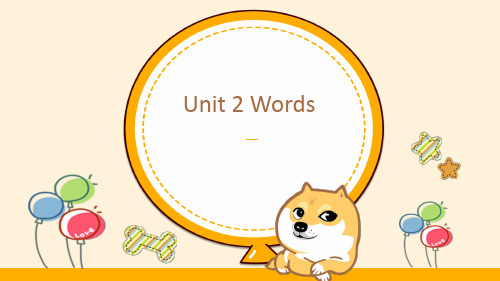
tie /taɪ/
n. 领带 v. 捆;束
haunted / 'hɔ:ntɪd/
adj. 有鬼魂出没的;闹鬼的
ghost /ɡəʊst/
n. 鬼;鬼魂
trick / trɪk/
n. 花招;把戏
treat / tri:t /
n. 款待;招待v. 招待;请(客)
spider / 'spaɪdə(r)/ n.
adipiscing elit.
mooncake / 'mu:nkeɪk /
n.月饼
lantern39;streɪndʒə(r)/
n. 陌生人
relative / ˈrelətɪv/
n. 亲属;亲戚
put on
增加(体重);发胖
pound / paʊnd/
Unit 2 Words
section A
Lorem ipsum dolor
Lorem ipsum dolor sit amet, consectetuer adipiscing elit. Aenean commodo ligula eget dolor. Lorem ipsum dolor sit amet, consectetuer
蜘蛛
Christmas / ˈkrisməs / n. 圣
诞节
lie / laɪ/
v. lay / leɪ /, lain / leɪn/
存在;平躺;处于
novel / 'nɒvl/
n.(长篇)小说
eve / i:v/
n(尤指宗教节假日的)前夕;前夜
dead / ded/
adj. 死的;失去生命的
初中英语词汇学精美课件ppt
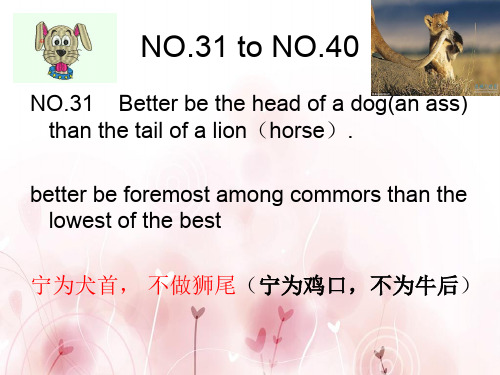
NO.32 The pot called the kettle black.
• Kettle n. (烧水用的)壶,水壶
the proverb is quoted as a comment by a third person when one person blames another for weaknesses he himself possesses 锅嫌水壶黑;有心说人 无意责己; 五十步笑百步
轮中有轮 幕后有人;情况错综复 杂
Байду номын сангаас
丘, 无意义的事,小困难(或障碍)
Don’t make a small difficulty of an important matter appear greater or more important than it is ;don’t exaggerate
不要大惊小怪 | 不要言过其实
NO.35 Too many cooks spoil the broth.
NO.31 to NO.40
NO.31 Better be the head of a dog(an ass) than the tail of a lion(horse).
better be foremost among commors than the lowest of the best
宁为犬首, 不做狮尾(宁为鸡口,不为牛后)
厨子多了煮坏汤
七手八脚反误事
NO.36 The child is the father of the man .
Every man was once a child and his character has developed from his character as a child
初中英语词汇学精美课件ppt (13)

efficient (adj.)
working well,ቤተ መጻሕፍቲ ባይዱuickly and without wasting time or energy 高效率的,效率高的
eg. a very efficient secretary
fatigue (n.)
accuse (v.)
to say that sb. has done sth. wrong or illegal 控告;谴责(某人)
eg. Don't accuse me of stealing from you. 别说我偷你东西。
谢谢观看~!
• mature (adj.)
1.physically, mentally, emotionally, etc, grownup 成熟的
eg. Be mature and stop acting as if you were a baby. 成熟点儿,别表现得像个孩子。
2.(of plans, theories, etc) fully considered 成熟的
refuse (v.)
1.to say firmly that you will not do or accept sth. 拒绝, 不接受
eg. The best thing is to refuse. 最明智的做法就是拒绝。 2. to not give or allow sb. sth. that they want.拒绝(给某
eg. We should upbuild mature system of law and statute. 我们应该建立完备的法律、法规体系。
effective (adj.)
七年级下英语1~6单元单词ppt课件ppt课件

[strɪkt]
adj.严格的;严厉的
be strict (with sb)
(对某人)要求严格
remember
[rɪ'membə] v.记住;记起
follow
['fɒləʊ]
v.遵循;跟随
follow the rules
遵守规则
luck
[lʌk]
n.幸运;运气
keep
[kiːp]
v.保持;保留
hair
shy
[ʃaɪ]
adj 羞怯的;腼腆的
save
[seɪv]
v 救;救助
symbol
[‘sɪmbl]
n象征
flag
[flæ ɡ]
n 旗;旗帜
forget
[fə'ɡet]
v忘记;旗杆
get lost
迷路
place
[pleɪs]
n 地点;位置
water
['wɔ:tə(r)] n水
danger
['deɪndʒə(r)] n 危险
n.吉他 v.唱;唱歌 v. & n.游泳 v.跳舞 n.舞蹈 v.画 n.国际象棋 下国际象棋
v.说(某种语言);说话 说英语
v.参加;加入 n.俱乐部;社团
精选ppt课件
3
be good
['stɔːrɪ]
write
[raɪt]
show
[ʃəʊ]
or
[ɔː(r)]
精选ppt课件
15
boat
[bəʊt]
ropeway ['rəʊpweɪ]
year
[ jɜ:]
afraid
初中英语单词教学课件
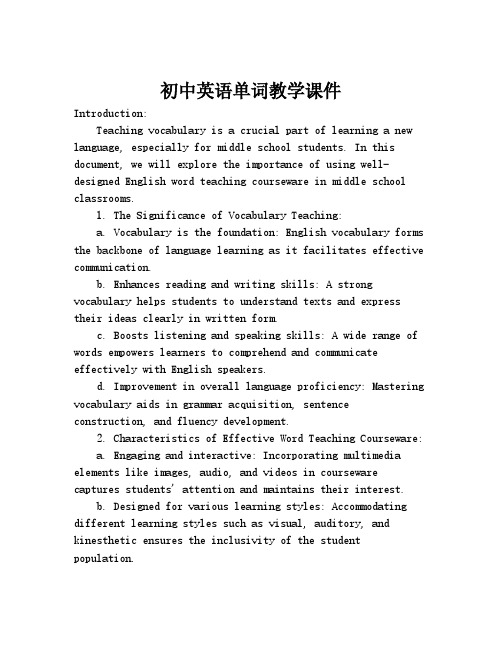
初中英语单词教学课件Introduction: Teaching vocabulary is a crucial part of learning a new language, especially for middle school students. In this document, we will explore the importance of using well-designed English word teaching courseware in middle school classrooms. 1. The Significance of Vocabulary Teaching: a. Vocabulary is the foundation: English vocabulary forms the backbone of language learning as it facilitates effective communication. b. Enhances reading and writing skills: A strong vocabulary helps students to understand texts and express their ideas clearly in written form. c. Boosts listening and speaking skills: A wide range of words empowers learners to comprehend and communicate effectively with English speakers. d. Improvement in overall language proficiency: Mastering vocabulary aids in grammar acquisition, sentence construction, and fluency development. 2. Characteristics of Effective Word Teaching Courseware: a. Engaging and interactive: Incorporating multimedia elements like images, audio, and videos in courseware captures students' attention and maintains their interest. b. Designed for various learning styles: Accommodating different learning styles such as visual, auditory, and kinesthetic ensures the inclusivity of the student population. c. Systematic organization: Organizing vocabulary into categories like animals, food, or emotions helps students recognize patterns and make connections. d. Gradual progression: Introducing words from basic to advanced levels allows students to build on their existing vocabulary knowledge and develop a sense of achievement. e. Contextual usage: Providing examples and sentences related to the words enables students to understand their meanings in context and enhances retention. f. Interactive exercises and games: Incorporating quizzes, puzzles, and word games in courseware promotesactive participation and reinforces learning. 3. Strategies for Utilizing Word Teaching Courseware Effectively: a. Pre-teaching activities: Conduct pre-teachingactivities like brainstorming, picture association, or word association to activate prior knowledge and arouse interest. b. Introduce words systematically: Present new words in a logical sequence, emphasizing pronunciation, spelling, meaning, and usage. c. Enhance comprehension: Use visual aids, gestures, miming or real-life objects to help students grasp the meaning of words.d. Reinforce learning: Provide opportunities for students to practice newly acquired vocabulary through group discussions, role-plays, and interactive exercises in the courseware. e. Consolidation through revision: Allocate regular revision sessions to reinforce learning and ensure long-term retention of vocabulary. f. Assess progress: Incorporate quizzes, online assessments, or oral examinations to evaluate students' progress and identify areas of improvement. 4. Multiple Benefits of Word Teaching Courseware: a. Time-saving preparation: Courseware can be reused, reducing the time spent on lesson planning. b. Visual aid for difficult words: Courseware provides visual representations and explanations for difficult or abstract concepts, making them easier to understand. c. Self-paced learning: Courseware allows students to revisit lessons at their own pace, enabling personalized learning. d. Continuous learning: Students can access courseware outside the classroom, facilitating self-study and continuous improvement. e. Improved engagement and motivation: Incorporating multimedia and interactive elements in courseware fosters students' interest and enthusiasm for learning.Conclusion: In conclusion, the implementation of well-designed English word teaching courseware plays a vital role in the effective teaching of vocabulary to middle school students. By utilizing engaging and interactive techniques, organizing words systematically, and providing context-based examples, we can enhance students' language proficiency and achieve successful learning outcomes.。
人教版初中英语单词背诵ppt课件

▪ juice [dʒu:s] ▪ n (水果;蔬菜;肉等
的)汁;水汁
▪ wardrobe [‘wɔ:drəub]
▪ n 衣柜
▪ sock [sɔk] ▪ n 短袜
▪ put away ▪ phr. 把.....什么
收起来(放好)
.
▪ broken [‘brəukən]
▪ adj 弄坏了的
▪ volleyball ['vɔli,bɔ:l]
▪ n 排球
▪ postal [‘pəustəl]
▪ adj 邮政的
▪ code [kəud] ▪ n 密码,符号
▪ tennis ['tenis] ▪ n 网球(运动)
▪ table tennis ▪ n 乒乓球
.
▪ roller-skating [‘rəuləskeiti ŋ]
.
▪ do morning exercises
▪ phr. 做早操
▪ go shopping ▪ phr. (去)买东西
▪ do (some) reading
▪ phr. 朗读,
▪ playground ['pleigraund]
▪ n(学校的)操场
▪ take time
▪ phr. 花费(时间) ▪ tear [tɛə] ▪ n (常用复数)眼泪,
▪ 电脑,电子计算机
▪ mouse [maus]n
▪ 鼠,耗子,鼠标
▪ keyboard ['ki:bɔ:d] n
▪ 键盘
▪ pear [pɛə]
▪ n梨
▪ banana [bə‘nɑ:nə]
▪ n 香蕉
▪ orange [‘ɔ:rindʒ]
人教版七年级英语上册Unit1单词课件

telephone/phone number 电话号 码
first /´fə:(r)st/ adj. 第一
first name 名字
last / la:st/, /læst/ adj. 最后的,末尾的
last name 姓
friend /´frend/ n.
朋友
China /´tʃainə/ 中国
Smith /smiθ / 史密斯(姓)
Ms./miz/(用于女 子的姓氏或姓名前, 不指名婚否)女士
his /hiz/ pron. 他的
and /ænd/ conj. 和;又; 而
her /hə:(r)/ pron. 她的
yes /jes/ interj.
是的;可以
she /ʃi:/ pron. 她
he /hi:/ pron. 他
Tom /tɔm/ 汤姆(男名)
Mike /maik/ 迈克(男名)
Jack / dʒæk / 杰克(男名)
Marry /´meəri/玛丽 (女名)
Miller /´milə/ 米勒(姓)
Lindae /dʒein/ 简(女名)
Green /gri:n/ 格林(姓)
no /nəu/
interj. 不;
没有;不是
not /nɔt/ adv.
不;
没有
zero /´ziərəu/ num. 零
one /wʌn/ num. 一
two /tu:/ num. 二
three /θri:/ num. 三
four /fɔ:(r)/ num. 四
five /faiv/ num. 五
name /neim/ n. 名 字
nice /nais/ adj. 令人愉快的, 宜人的
初中英语单词PPT
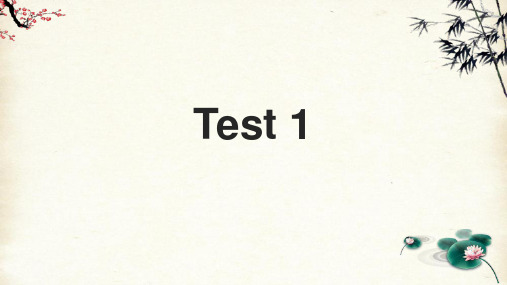
22. fat adj. 肥胖的 23. fast adj. 快速的 24. far adj. 远的 25. famous adj. 著名的
26. fair adj. 公平的 27. favorite adj. 最喜欢的 28. free adj. 空闲的,免费
的 29. full adj. 满的,饱的 30. get v. 得到 31. give v. 给 32. go v. 去 33. grow v. 生长 34. guess v. 猜测 35. greet v. 打招呼 36. guide v. 指导 37. gift n. 礼物
14. appreciate v. 欣赏 15. argue v. 争论 16. activity n. 活动 17. address n. 地址 18. age n. 年龄 19. air n. 空气 20. attention n. 注意 21. accident n. 事故 22. able adj. 能够的 23. awful adj. 可怕的 24. active adj. 活跃的 25. afraid adj. 恐惧的
14. floor n. 地板 15. foreign adj. 外国的 16. foreigner n. 外国人 17. future n. 未来 18. friendly adj.友好的 19. friendship n. 友谊 20. fun n. 玩笑,乐趣 21. funny adj. 有趣的,滑
26. climb v. 攀爬
38. cook v. 煮
27. close v. 关&adj. 关着的 39. copy v.复制&n.复制品
28. come v. 来
40. cost v. 花费& n. 开销
- 1、下载文档前请自行甄别文档内容的完整性,平台不提供额外的编辑、内容补充、找答案等附加服务。
- 2、"仅部分预览"的文档,不可在线预览部分如存在完整性等问题,可反馈申请退款(可完整预览的文档不适用该条件!)。
- 3、如文档侵犯您的权益,请联系客服反馈,我们会尽快为您处理(人工客服工作时间:9:00-18:30)。
高级)最多
13.interesting(adj.)→ interest (n.&v.)兴趣;爱好; 对……感兴趣 → interested (adj.)感兴趣的 14.difficult(adj.)→ difficulty (n.)困难→ easy (adj.
反义词)容易的
15.relaxing(adj.)→ relaxed (adj.)感到轻松的→relax ___
1.We will make our school more beautiful.
S+v+o+c 2.I feel so good today. S+v+p 3.He remained poor twenty years later. S+v+p 4. My father worked in a hospital. S+v 5. In summer you can swim in the lake. S+V 6. He often help me solve my problems in maths. S+v+o+c 7. I have never seen the word used that way before. S+v+o+c 8. He show me how to run the machine. S+v+o+o
英
语
第2讲 七年级(上)Units 6-9
1.healthy(adj.)→ health (n.)健康 2.really(adv.)→ real (adj.)真的→ true (adj.同义词)真的 3.fat(adj.)→ thin (adj.反义词)瘦的 4.good/well→ better (比较级)→ best (最高级) 5.buy(v.)→ buying (现在分词)→ bought (过去式)购买 6.sell(v.)→ sale (n.)特价销售;出售 7.favorite(adj.)→ like...best (同义短语) 8.music(n.)→ musician (n.)音乐家→ musical (反义词)→ happiness (n.)高兴 10.busy(adj.)→ business (n.)生意;商业→ free (adj.反 义词)空闲的 11.art(n.)→ artist (n.)艺术家 12.useful(adj.)→ useless (adj.反义词)无用的 13.photo(n.)→ photos (pl.)照片
•2.并列句: 由并列连词and /but /or/ so /neither...nor…/ either…or..等把两个或两个以上 的简单句连接起来。
•如:Come here and I’ll help you. • I am sorry, but I have to tell you the truth.
7.those(pron.)那些→ that (单数)那个 nineteen ninth 8.nine(num.)→ (序数词)→ (十九)→ ninety 九十) _________( 9.easy(adj.)容易的→ easily (adv.)容易地
10.help(v.&n.) → helpful (adj.)有益的 11.know(v.)→known (过去式)→ knew (过去分词) 知道 12.many(adj.)→more (比较级)更多的→ most (最
(v.)使轻松
1.first name 名字 last/family name 姓 2. middle school 中学;初中 3. phone/telephone number 电话号码 4. 5.ID card 身份证 6. Lost and Found 失物招领 7. watch TV 看电视 8. excuse me 劳驾;请原谅 9. thank you for... 为……而感谢你 10.a set of 一套;一副 11.a photo of my family 一张我的全家照 12.play computer games 打电脑游戏
•状语从句: 时间、地点、原因、条件、让步、方式、结果、 目的、比较 共9种状语从句)
• 判断下列句子是简单句、并列句还是复合句: 1.We often study Chinese history on Friday afternoon. 2. The boy who offered me his seat is called Tom. 3. There is a chair in this room, isn’t there? 4. My brother and I go to school at half past seven in the morning and come back home at seven in the evening. 5. He is in Class One and I am in Class Two. 6. He was fond of drawing when he was yet a child. 7. Neither has he changed his mind, nor will he do so. 8. What he said at the meeting is very important, isn’t it? 9. The farmer is showing the boy how to plant a tree. 10. Both Tom and Jack enjoy country music.
think about 1. 思考;思索 2.have... for breakfast 早餐吃…. 3. ask sb. for sth. 询问某人某事 4.eating habits 饮食习惯 5. How much ...? ……多少钱? 6.a pair of 一双 7. How old ...? ……多大年纪? 8. school trip 学校郊游 9. English test 英语测试 10. art festival 艺术节 11. soccer ball 足球 12. for sure 无疑;肯定 13. at a good price 以优惠的价格 14. on weekends 在周末 15.Have a good time/day ! 过得愉快! 16. favorite subject 最喜爱的学科 17.from... to... 从……到……
判断类型和句子成分:
came. She likes English. She is happy. The teacher asked me to read the passage. She bought a book for me. She gave John a book. My head aches. She makes her mother angry. The sun was shining. The moon rose. They talked for half an hour. 他们谈了半个小时。 The dinner smells good. 午餐的气味很好。 Everything looks different. 一切看来都不同了。 He is growing tall and strong. 他长得又高又壮。 His face turned red. 他的脸红了。
•3.复合句:又称为主从复合句,是由一个主句和一 个或者一个以上的从句构成的句子.
•主句和从句都具有完整的主谓结构.主句是句子的主体,从 句有一个从属连词(如that/what/why/how/if等)引导,修 饰说明主句或主句中的某个词或短语,不能独立存在.
•
•从句可以分为三大类: •定语从句(形容词性从句) •名词性从句:主语从句,表语从句,宾语从句和同位语从句
There be 句型 由 there + be + 主语 + 状语构成.用以表达存在,一种无主 语的有。 它其实是倒装的一种情况,主语位于谓语动 词 be 之后,there 仅为引导词,并无实际语。Be 与其后 的主语在人称和数量上一致,有时态和情态变化。如: 现在有 there is/are … 过去有 there was/were… 将来有 there will be…/there is(are) going to be... 现在已经有 there has(have) been… 可能有 there might be... 肯定有 there must be …/there must have been... 过去曾经有 there used to be … 似乎有 there seems/seem/seemed to be … 碰巧有 there happen/happens/happened to be … 此句型有时不用be动词,而用 live, stand, come, go, lie, remain, exist, arrive,等。
英
语
第1讲 七年级(上)Units 1-5
1.my(pron.)→ mine (名词性物主代词)我的 2.one(num.)→ first (序数词)第一
3.good(adj.)→ well (adv.)好;对;满意地 4.family(n.)→ families (复数)家庭
5.this(pron.)→ these (复数)这些 6.friend(n.)→ friendly(adj.)友好的→ unfriendly (adj.) 不友好的→ friendship (n.)友谊
12.true(adj.)→ real (adj.近义词)真的→ truth (n.)事实; 真相 13.noisy(adj.)→quiet (adj.反义词)安静的→ noise _____ (n.) 噪音 14.luck(n.)→ lucky (adj.)幸运的→ luckily (adv.)幸 运地 15.beautiful(adj.)→ beauty (n.)漂亮→ ugly (反义词) 16.sleep(v.)→ asleep (adj.)睡着的→ sleepy (adj.)困 倦的→ wake (v.反义词)醒来 17.danger(n.)→dangerous (adj.)危险的→ safe (adj. 反义词)安全的 18.young(adj.)→old (adj.)年老的 19.child(n.)→ children (复数) 20.dirty(adj.)→ clean (adj.反义词)干净的 21.cross(v.)→ across (adv.&prep.)过;穿过→ crossing ____________ (n.)十字路口
